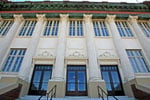Numerous FBI-intercepted telephone calls between Demetrius Colbert of Marianna and admitted drug dealers who are now serving time in prison were played aloud in a federal courtroom Tuesday, in what prosecutors said illustrated how the drug business was thriving in 2010 and 2011 in Lee and Phillips counties.
Colbert, 38, is the only suspected large-quantity drug dealer named in a group of seven indictments handed up in October 2011 to go to trial. The indictments were the result of a sweeping FBI-led investigation known as Operation Delta Blues. They accused 71 people, including five law enforcement officers, of engaging in a large-scale drug trafficking and public corruption ring centered in the Arkansas Delta over a period of years.
Colbert faces extensive prison time if convicted of conspiring to distribute more than 5 kilograms of powder cocaine in the Marianna area in 2010 and 2011. He also faces gun, assault and telephone charges.
Among those who testified Tuesday on the government's behalf was Leon Edwards, who was considered the No. 2 defendant, and who pleaded guilty on April 24, 2012, to the conspiracy charge in exchange for a 22-year prison sentence. He said he signed a cooperation agreement with federal prosecutors and hopes his testimony will result in his sentence being reduced by as much as half, although no promises were made.
Edwards, 36, worked alongside business partner Sedrick Trice, 30, at AC Customs, an automotive shop on Arkansas 49 in Helena-West Helena, where, Edwards acknowledged Tuesday, little work was done on automobiles. He admitted that he and Trice's primary business was selling drugs, many of which he said they got from Colbert.
Trice, the main defendant in the Delta Blues operation and the first person to plead guilty, is serving a 40-year sentence on the conspiracy charge and a gun charge.
Edwards testified that he bought resellable quantities of cocaine from Colbert two to four times a week in 2010 and 2011 in amounts ranging from 21/2 ounces to a kilogram, which is the equivalent of 35 ounces or 2.2 pounds. He most frequently purchased either 41/2 ounces or 9 ounces, with the latter generally costing $7,850.
As many of the calls were played in court, he acknowledged he and Colbert used coded language when he placed orders, in which a request for a "nine-piece chicken dinner" meant he wanted 9 ounces of cocaine, a "mile" referred to an ounce of cocaine and "half a motor" referred to a half-kilo, or 17.5 ounces.
Edwards said he and Colbert usually met to exchange drugs for cash in the parking lot of an abandoned shed in Rondo that they referred to in the phone calls as "the pool hall."
By playing many of the wiretapped calls in succession, Assistant U.S. Attorney Julie Peters showed that the men exchanged several calls a day, week after week.
Edwards testified that he introduced Colbert, a longtime acquaintance, to Trice, who cooked the powder cocaine into crack to resell it. On cross-examination by defense attorney Mark Hampton, Edwards acknowledged that Colbert wasn't his or Trice's only source of cocaine, saying they used "maybe two" other suppliers.
Hampton asked about the frequency of calls and why Edwards would sometimes order several 41/2- or 9-ounce quantities in a single day, or over two or three days, rather than getting a larger amount at one time.
Edwards replied that he would call in orders "as the people were coming by" his shop, and that he wanted the cocaine packaged separately so it could be easily handed off to the customers who ordered it in those amounts.
The largest amount of cocaine he ever bought from Colbert was when he bought a kilogram of the drug for $32,000, he said.
The trial resumes at 9 a.m. today before U.S. District Judge James M. Moody Jr.
Metro on 06/04/2014

